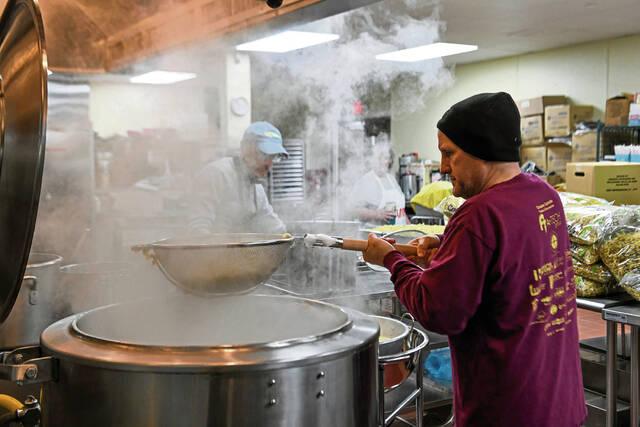District judges in Pennsylvania, including the 16 in Westmoreland County, imposed cash bail more frequently and in higher amounts for Black defendants in 2016 and 2017, according to a report from the American Civil Liberties Union.
Common Pleas Court President Judge Rita Hathaway said she doesn’t think the color of a defendant’s skin plays a role in the bail decisions for Westmoreland County district judges. They look at a suspect’s background, employment, safety issues, the charges and ties to the community, among other factors, when setting bail.
“I think we’re always trying to do a balancing act,” she said. “They don’t want to incarcerate a person needlessly.”
Westmoreland magistrates, on average, set bail at just over $38,000 for Black defendants, compared to about $19,000 for white defendants, making the county the third worst in Pennsylvania for that measure, the ACLU’s analysis found. Other Western Pennsylvania counties landed in the Top 10 include Beaver, Butler, Indiana, Lawrence, Somerset and Washington.
The report also found that cash bail is set in 50% of cases involving a Black defendant in Westmoreland County. For white defendants, the rate was 29%. For that measure, Westmoreland ranked eighth in the state.
ACLU criminal justice investigator Jessica Li said the report shows that bail practices need to be examined everywhere in the state, not just in big cities.
“Mass incarceration is a crisis in Pennsylvania, and it might not feel like it, but it’s an incredibly local and proximate issue that happens in our backyards,” she said.
When a person accused of a crime is arraigned, a district judge can release the defendant on their own recognizance or unsecured bail. Another option is to set cash bail that the defendant, who typically doesn’t have an attorney at that stage, must post to remain free pending future court proceedings. If the person can’t afford the amount — or bail is denied — they are taken to jail while the case works through the system.
The number of people held in jail pretrial has increased nationally over the past 40 years because of bail setting practices, according to Wanda Bertram, spokeswoman at Prison Policy Initiative. The average person in jail who can’t afford bail has an annual income of $16,000 before incarceration. There are nearly half a million people being held in U.S. jails on bail awaiting trial, according to the agency.
The data used in the ACLU report was obtained through the Administrative Office of Pennsylvania Courts. Researchers from the University of Pennsylvania helped with the analysis.
The 18-page report, titled “Broken Rules: How Pennsylvania Courts Use Cash Bail to Incarcerate People Before Trial,” examined 383,000 cases. It found that the average amount of cash bail set in Pennsylvania was $38,433. That was out of reach for many defendants, with 97,000 being held in jail until trial. Cash bail, the most common method, was used in 43% of cases.
In Westmoreland, the average bail amount was $23,548. About 71% of defendants were jailed because they couldn’t post it, Li said. Cash bail was used in about 32% of cases.
’Embarrassed’
District Judge Charles R. Conway said it is important to evaluate each case individually when deciding bail at his Export court. Unaffordable bail amounts can unfairly disadvantage the poor and anyone who doesn’t have the means to pay it, he said.
“I am embarrassed that Westmoreland County data shows we require almost twice as much cash bail for those with a darker complexion than others, but I am more embarrassed that our average bail amounts are often unreachable, even for those who are employed,” he said. “The statewide average bail amount is very close to Westmoreland’s average and more than half the average household income in Pennsylvania.”
There will always be cases in which a defendant must be jailed pretrial based on community and individual safety, Conway said. But most cases should be assessed for risk and probability that a defendant will show up for court proceedings, he said, with potential supervision in a pretrial program through the probation office.
“The presumption of innocence means little if the default setting is to set a bond higher than a defendant can reasonably afford,” he said. “The actual law in Pennsylvania requires that the default setting is one of pretrial release.”
The ACLU report found that bail-setting practices varied widely among judges across the state, with the same issues seen in rural counties as well as more-populated areas. Statewide, district judges imposed an average of $12,866 more on Black defendants than white ones. Cash bail was set in 55% of cases involving Black defendants and 38.5% of cases with white defendants, the report showed.
Li said it is important to the presumption of innocence, ensuring citizens’ freedoms and preserving tax dollars for local and state officials to examine bail-setting practices.
“We pay for thousands of people to be locked up behind bars who are presumptively innocent,” she said. “It’s fiscally irresponsible. It’s unconstitutional. It’s inhumane and immoral.”
The Administrative Office of Pennsylvania Courts is seeking public comment until March 8 on proposed rules that would address bail and other issues. A work group established in 2018 led to the criminal procedural rules committee’s recent proposal to address pretrial detention through procedural amendments, risk assessment tools and pretrial services.
Documents show that the proposal includes bail review hearings two days after an arraignment for anyone who remains jailed. Counsel would be appointed for those hearings. Hathaway said anyone being held in the county jail on bail is able to file a motion to request a bail hearing.
“That’s always heard within a couple of days … or at the most within a week,” the judge said.
The ACLU report was shared with the Westmoreland’s district judges and could be discussed at a meeting among them this month, she said.








